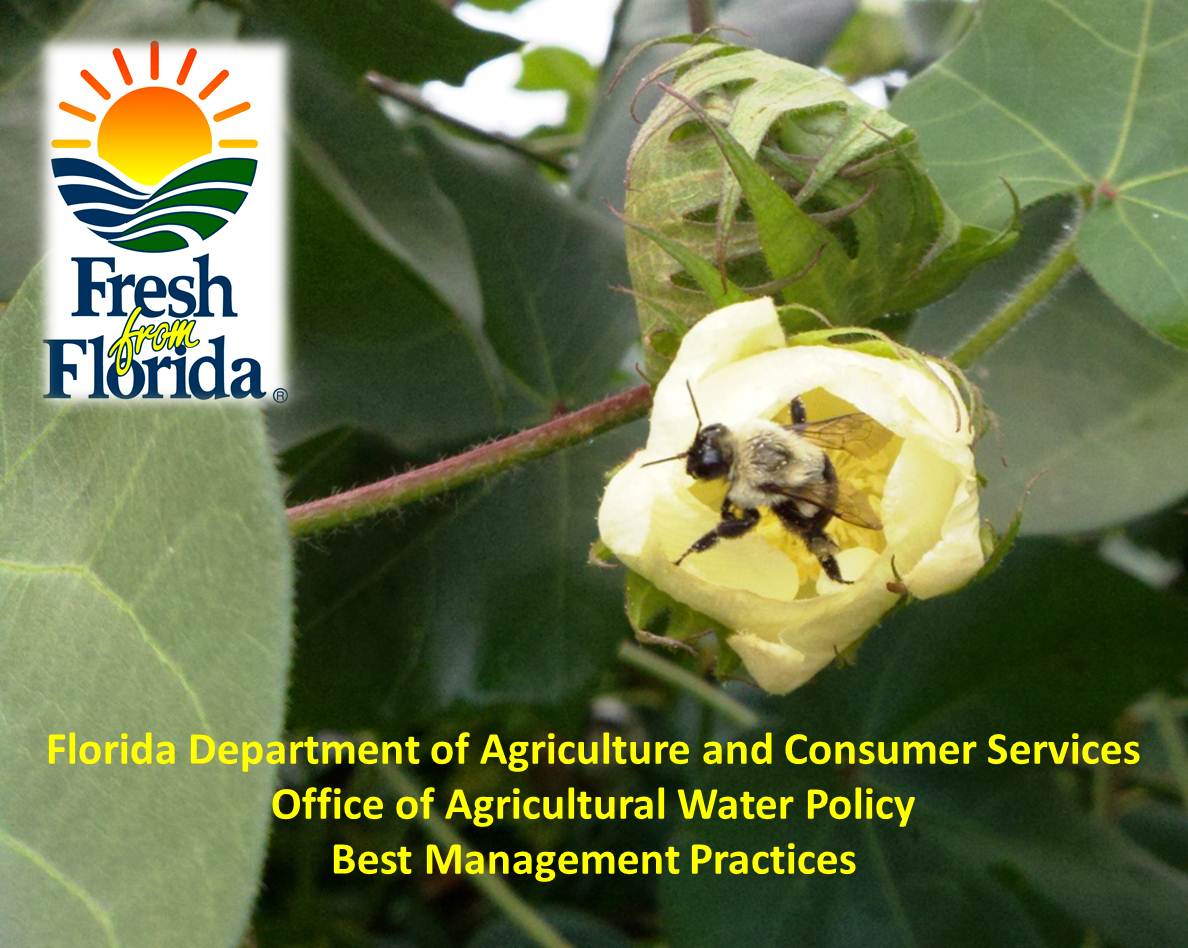 Submitted by Rance Ellis, FDACS, North Florida Field Staff, BMP Program.
Submitted by Rance Ellis, FDACS, North Florida Field Staff, BMP Program.
Florida law provides a presumption of compliance with state water quality standards to producers who enroll in and implement best management practices (BMPs) adopted by the Florida Department of Agriculture and Consumer Services (FDACS). However, continued support for this approach depends on the level of ongoing grower participation in BMP programs.
Working with the agricultural industry, the University of Florida Institute of Food and Agricultural Sciences (IFAS), and others, FDACS has adopted BMP manuals for citrus, vegetable/row crop, container nursery, sod, cow/calf, specialty fruit and nut, equine, silviculture, and aquaculture operations (http://www.floridaagwaterpolicy.com/). Each BMP manual covers key aspects of water quality and water conservation. Typical practices include:
Nutrient Management to determine nutrient needs and sources, and manage nutrient applications (including manure) to minimize impacts to water resources.
Irrigation Management to address the method and scheduling of irrigation to reduce water and nutrient losses.
Sediment and Erosion Control to reduce or prevent the transport of nutrients and sediments from production areas to water bodies.
Benefits of Implementing BMPs
While FDACS BMPs focus on protecting water quality and conserving water, there are other benefits to enrolling in and implementing BMPs (besides the presumption of compliance). For instance:
- BMP participation demonstrates agriculture’s commitment to water resource protection, and maintains support for this non-regulatory approach to meeting water quality and conservation goals.
- Implementing FDACS BMPs satisfies the statutory requirement for agriculture in areas where the Florida Department of Environmental Protection has adopted a basin management action plan. BMPs also may satisfy some water management district permitting requirements.
- The Florida Right to Farm Act generally prohibits local governments from regulating an agricultural activity that is addressed through FDACS-adopted BMPs when farmers implement them.
- Producers enrolled in FDACS BMP programs are eligible for cost-share, when available.
- Some BMPs increase production efficiency and reduce costs. The Gwinn Brothers Farm in Suwannee County has been saving millions of gallons of water a year after upgrading their irrigation systems. Installation of Global Position Systems on their tractors has reduced overlap in fertilizer applications and saved on fertilizer costs. Both of these practices have lessened the impact on the environment.
How to Enroll in FDACS BMPs
Enrolling in FDACS BMPs involves on-site assessment of opportunities for improving water quality and water conservation. The assessment includes a review of fertilization and irrigation practices, identification of water resource features through soil maps and aerial photography, and discussion of how to address any observed concerns. This is a critical part of the enrollment process because the presumption of compliance is based on the expectation that producers understand and address the water quality and conservation issues on their operations, within economic and technical constraints.
The outcome of the assessment is completion of a checklist that records the BMPs applicable to the operation. The producer then signs and submits a Notice of Intent to Implement BMPs, along with the completed checklist, to enroll the operation in the FDACS program. You already may be doing all the BMPs applicable to your operation, or there may be some additional needed practices that are feasible for you to implement. Trained staff and contractors are available to assist producers with on-site assessment and BMP selection, and with understanding record-keeping requirements.
Here are some things to do in preparing for an enrollment visit:
- Make sure there is someone available the day of the visit that is familiar with the nutrition program and irrigation regimes of your operation. These are the cornerstones of all FDACS water quality BMP programs.
- During the visit, FDACS staff will take a look at the operation with you or your representative to determine what BMPs are needed to reduce or avoid impacts to water resources (such as wetlands, streams, sinkholes, and springs) that are on or near your property. Having a pre-planned route will make the assessment/enrollment process more efficient.
- Be ready to help the FDACS representative in identifying the parcels of land that you wish to enroll in the program. It is important that the tax parcel identification numbers submitted on the NOI be accurate.
- It helps to read the relevant BMP manual before scheduling a site assessment, and to jot down any questions you may have about the BMPs, unfamiliar terms, or other manual contents.
After Enrolling in BMPs
Implementing the BMPs is the key to maintaining a presumption of compliance with state water quality standards. An important part of BMP implementation is documenting them through record keeping. This is sometimes the only way to confirm BMP implementation. FDACS manuals require record-keeping for specific practices. BMP records should be accurate, clear, and well-organized. You may develop your own record-keeping forms or use the ones provided in the manuals.
The Bottom Line
Along with local governments and private industry, the agricultural community is expected to reduce their impacts to water resources. It is important that producers enroll in and implement applicable BMPs to underscore agriculture’s participation in and commitment to water resource protection. As the agricultural industry becomes more involved in BMPs, support for this approach to achieving water quality and conservation goals will continue.
Who to Call for Help
To receive a manual, schedule a site visit, or for any questions about this program, please contact Rance Ellis. He is the new FDACS field staff for north Florida and can be reached at 850-394-9124 ext. 130 (office) or 850-557-5227 (mobile), or email at rance.ellis@freshfromflorida.com.
- Maintaining Dissolved Oxygen Levels in Your Pond to Reduce Fish Kills - September 21, 2018
- The Bumble Bee – One of Florida’s Vital Pollinators - September 14, 2018
- 2017-2018 Bee Informed Partnership’s National Bee Colony Loss Report - July 13, 2018
